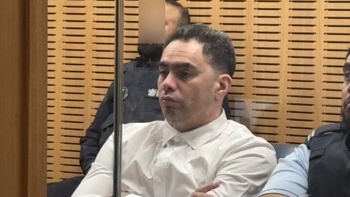Police will use a controversial DNA tool in a bid to solve two of the country’s most high-profile cold case murders, the Herald can reveal.
Law enforcement agencies overseas have had success comparing the DNA of unidentified suspects with genetic profiles uploaded to popular genealogy websites, most famously leading the FBI to catch the so-called “Golden State Killer”.
The Herald earlier revealed detectives hoped to use a genetic investigative tool for two cold cases - the murder of Alicia O’Reilly in 1980, dubbed Operation Sturbridge, and Operation Dallington, the inquiry into the murder of Mellory Manning in 2008.
Detective Superintendent Ross McKay has now confirmed to the Herald that New Zealand Police and the Institute of Environmental Science Research (ESR) would trial the use of the genetic investigative tool in both inquiries.
Both families had been advised of the development, McKay said.
“We acknowledge this is a difficult time for these families and hope we can provide them with the information they need to seek closure on these cases.”
Manning’s brother Rob told the Herald yesterday the police’s decision to trial the DNA tool was a “brilliant outcome”.
“Anything that’s going to increase the chances is really positive,” Manning said.
“It just shows we’ve got the technology there so let’s use it, and if it can help this case and help other families as well, I don’t think anyone can say it’s a bad thing.”
/cloudfront-ap-southeast-2.images.arcpublishing.com/nzme/F33UXREL7PAM5J2XISSWZETBKI.jpg) Nancye O'Reilly with a portrait of her youngest daughter Alicia. Photo / Alan Gibson
Nancye O'Reilly with a portrait of her youngest daughter Alicia. Photo / Alan Gibson
Forensic Investigative Genetic Genealogy (Figg) combines DNA testing with genealogical research to analyse genetic relationships between individuals who share very small amounts of inherited DNA with the crime scene DNA sample using genealogy databases and publicly available records, and is being used internationally to help solve cold cases and identify human remains.
“Using techniques like Figg has the potential to provide investigative leads and potentially resolve some of the most serious unsolved crimes,” McKay said.
“This is a complex investigative tool and only cases where suitable DNA evidence has been captured during the criminal investigation would be considered after all other investigative avenues have been considered and exhausted.”
In order to meet New Zealand conditions, ESR ensured that all physical sample testing was completed in New Zealand and extractions of the digital genetic code would be provided to a third-party international service provider. This meant no physical DNA material would leave the country.
“Results from genealogy websites, where submitters provide law enforcement access to their records, are used as the basis of genealogy searching of publicly available records such as genealogy databases, church records, and libraries,” McKay said.
“Criteria has been developed and assessed to determine the trial’s success. A staged approach to measuring success has been developed and an evaluation of the trial will be conducted at the conclusion of the use of FIGG for these two cold cases.”
/cloudfront-ap-southeast-2.images.arcpublishing.com/nzme/PPOVQ5YD6ZCZXNLHGMNIHWVGSA.jpg) Mellory Manning was murdered in 2008.
Mellory Manning was murdered in 2008.
Ngati “Mellory” Lynette Manning, 27, was murdered in 2008. Police allege Manning, who had spent several months out of prostitution and was only out for one night to get money for Christmas presents, was subjected to a horrific attack at a Mongrel Mob gang pad, where it’s believed she was raped, stabbed and bashed by several people.
Alicia O’Reilly, 6, was found dead in her bed in the Auckland suburb of Avondale in August 1980, while her sister Juliet, 8, slept just metres away in the same room.
The horrendous crime shocked the country and hundreds of suspects were questioned in the homicide investigation, but Alicia O’Reilly’s killer was never found.
Detectives working on the case decades later believed that forensic evidence - hair and semen left by the killer - had been inexplicably destroyed during the original investigation.
But in a stunning twist three years ago, some unmarked samples were found in archives and scientists from ESR, the Crown research institute, were able to extract a full DNA profile of the perpetrator.
Her mother Nancye O’Reilly was pleased that Figg opened another avenue for the investigation to follow, but was also keeping her expectations in check.
“I’m just trying to not get my hopes too high. In the past, there have been breakthroughs and it’s come to nothing,” O’Reilly said.
“I just have to keep a lid on [my emotions] really, otherwise it’s a huge disappointment... I just want an answer either way, yes or no, because at the moment I’m in purgatory.”
Barry O’Reilly, Alicia’s father who lives in Australia, declined to comment. He’s previously said he hoped the genealogy testing could solve other cold cases in New Zealand, and the public would support the police decision.
“We, as Alicia’s parents, are hoping this technology will find the person who viciously took Alicia’s life. Alicia can then be allowed to rest in peace,” Barry O’Reilly said previously.
McKay said using techniques like Figg provides police with the opportunity to “resolve these cases and make our communities safer”.
Tens of millions of people worldwide have shared their profiles online, meaning the likelihood of law enforcement finding a genetic relative to a suspect has vastly improved.
Detectives can then use the results of a genetic genealogy search alongside other records to construct a family tree, to then identify the most likely suspects for further investigation.
The technique has been used to solve cold cases overseas, most notably the capture of the “Golden State Killer”, who committed at least 13 murders and 51 rapes between 1974 and 1986.
While the potential of genetic genealogy for criminal investigations is obvious, the technique is not without controversy; not least the concerns of private citizens voluntarily giving their DNA to a private company for one purpose, only for the state to use it for a very different one.
Adding another layer of complexity to whether genetic genealogy can be used to find Alicia O’Reilly or Mellory Manning’s killers is that the current law governing the use of DNA in criminal investigations needs to be overhauled.
A review by the Law Commission, published in November 2020, found the Criminal Investigations (Bodily Samples) Act was “no longer fit for purpose” and made 193 recommendations for change.
Given the significant privacy concerns around turning users of ancestry websites into unwitting “genetic informants” against their relatives, the Law Commission said any new legislation needed appropriate safeguards for police to use genetic genealogy.
“Our view is that genetic genealogy searching should be used as a last resort and only in relation to offending that, when considered in its full context, is sufficiently serious to warrant the use of such an intrusive investigative technique.”
While the Labour Government accepted the Law Commission findings in early 2021, no progress has been made on changing the law.
Privacy Commissioner Michael Webster has previously told the Herald he was supportive of the “safe use” of emerging technologies “to advance law enforcement objectives, where this is done in a justified, proportionate, and transparent manner”.
The Office of the Privacy Commissioner also supported the recommendations of the Law Commission review into the use of DNA in criminal investigations and Webster had “some concerns” about the use of Figg without an appropriate legislative framework in place.
“Genetic data is highly sensitive personal information, not only for individuals, but also for their wider whānau. Figg can be useful to create investigative leads; however, it is a technique that raises a number of ethical and privacy issues. There are also unique considerations for the use of Figg in the New Zealand context, such as taking into account te ao Māori perspectives.”
He said a “precautionary principle” to the potential use of commercialised DNA analysis should operate.
“Access by law enforcement should be statutorily limited or controlled in any new legislation.”
The decision to trial Figg in the investigation of Alicia O’Reilly’s murder comes three years after a startling breakthrough in August 2020 gave renewed hope that her killer would be identified.
But no DNA match has been found so far.
This is despite the genetic code being compared to hundreds of thousands of profiles, collected from criminals or crime scenes since the mid-1990s, held in DNA databanks in New Zealand and Australia.
Another 193 suspects have been ruled out so far after giving voluntary DNA samples.
One person has been arrested in relation to Mellory Manning’s death. But former Mob prospect Mauha Fawcett had his conviction for murder quashed and charges dismissed after it was found his Foetal Alcohol Spectrum Disorder meant his statements in police interviews were unreliable, as well as police conduct during the interview process.
During the police inquiry, a DNA profile from semen found on Manning’s body was attributed to an unidentified person, referred to as “Male B”.
Despite extensive testing, Male B has never been identified.
Rob Manning says it’s pivotal those responsible for his sister’s murder are held to account.
“These people that did this are still out in the public right now,” he says. “What they are capable of doing, what they did to Mellory, is brutal. Everyone is at risk around these people.”
Jared Savage is an award-winning journalist who covers crime and justice issues, with a particular interest in organised crime. He joined the Herald in 2006, and is the author of Gangland and Gangster’s Paradise.
Sam Sherwood is a Christchurch-based reporter who covers crime. He is a senior journalist who joined the Herald in 2022, and has worked as a journalist for 10 years.
Take your Radio, Podcasts and Music with you









